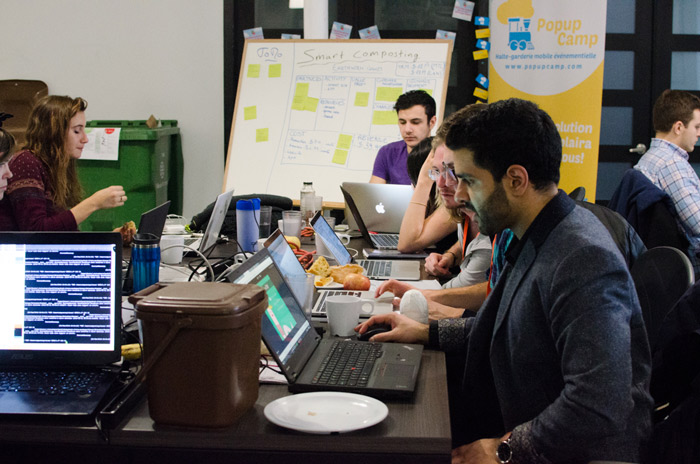On Jan. 29, 120 developers, designers, entrepreneurs, and experts gathered in downtown Montreal to look for sustainable solutions to address Montreal’s energy problems. The event, Start-Up Weekend: Sustainable Cities, was part of a creative marathon set up by the city of Montreal to tackle the city’s fossil fuel dependency. Sparked by citizen efforts to raise awareness about fossil fuel consumption, the city has pledged to reduce fossil fuel consumption to pre-1990s levels.
Compared to traditional startup competitions and hackathons, the participants came from a wide range of backgrounds, and diversity was encouraged in team formation.
“It’s definitely a different model,” Diana Cheptene, one of the event’s head organizers, said. “The goal is to bring groups that never get together, and see what kind of innovation comes out of it.”
In the past, Cheptene has helped organize two other similar startup weekends. The appeal of startups is generally oriented towards individuals, like Cheptene, who look towards grassroot initiatives and social businesses to meet certain needs. It was this creative atmosphere that drew community members like Laura Vurpillot, a McGill master’s student with ties to Montreal’s startup ecosystem.
“I think it’s a great chance to meet really interesting people,” Vurpillot said. “We have great mentors to help us build our project, and I’m really into innovative ideas. I think it’s really cool to work in a team, like we have two days to build a project, and show it in front of a jury at the end. It’s a very stimulating environment.”
The event’s organisers took the theme of sustainability to heart, hoping to create long-lasting effects. One of the biggest sources of waste at events like startup weekends, explained Monika Potocki, one of the organizers, comes from disposable plates and other unsustainable catering practices. The event aimed to be zero-waste, a lofty goal considering the quantity of food and beverages required to sustain 120 people over a weekend.
“It’s very challenging because when you want to grasp sustainability you can scratch the surface or really delve down deep into where you’re getting the food from, where your suppliers are getting their food,” Potocki said. “It takes a lot of research, and sometimes due to budget we have to compromise on some sides. Definitely a challenge but worth it. And since the advertisement was ‘zero waste’ we wanted to keep our word.”
A startup weekend, she explained, is an opportunity to encourage people to think about sustainability in their daily lives, and not just in the fifty four hours of the competition.
“It’s important because just the context of startup weekend, people come for different reasons but this is an opportunity to change people’s behaviours,” Potocki explained. “It’s an opportunity to change people’s behaviour after this event. But we get the chance for the 54 hours to enforce a different way of approaching sustainability.”
Beyond just encouraging participants to lead more sustainable lives after the competition, the event has other long-reaching effects—about 12 per cent of participants usually go on to lead more sustainable lives.
“We’ve got some pretty cool success stories out there,” Potocki said. “But most people come to these event for the experience. For the people they meet, or learning a new skill, or practicing, or having time with the mentors.”
The event has 15 mentors who are experts in their field to guide the participants. Their skills usually range from business and development to sustainability. The ideas at the competition tackled problems in vastly different areas. One project, which featured McGill Urban Studies student Jordan Bowden as a team member, focused on helping the visually impaired way find in unfamiliar locations. To do this, the team created tactile maps that allows users to ‘feel’ their way around.
“We’re making use of 3-D printing to produce a map that an individual can feel,” Bowden stated. “We’re also making use of an iPad, which will enable the user to get audio feedback as well as tactile feedback. This is really needed, there’s a lot of research showing that tactile maps can create really good outcomes for people.”
[metaslider id=43174]
The team’s project helps those with any kind of vision loss in a number of ways.
“People with visual impairments can feel a lot of social isolation,” Bowden said. “This project really aims to reduce that by enabling people to feel more comfortable in the world and wayfind through spaces they may not be familiar with.”
Vurpillot’s team, on the other hand, worked on developing sustainability-themed education programs.
“I’m working on a project called ecosphere, and it’s basically to encourage people to be more aware of sustainable development and adapt their way of life to be more sustainable,” Vurpillot explained.
One of the participants, Stephanie Pataracchia worked with two other McGill alumni to develop a strategy to incentivize reducing energy consumption. The project ended up winning the first place prize for the competition.
“We’re working on an application that integrates with people’s smart meters, and we want to incentivize them as a community to reduce their energy consumption and reward them with perks,” Pataracchia said.
The ideas that come out of startup weekend are just some of many in Vert Montreal’s creative marathon. Other events include ProtoHack, a walkathon/prototyping, and an ideathon, along with a hackathon to end the month-long series of events.
Where the creative marathon differs from other start-up and idea-generating events is in both its accessibility to those of non-technical backgrounds, and also its connectedness with the big-picture problem of reducing fossil-fuel dependencies. Although having a technical background helps, it’s by no means a prerequisite.
“Just do it,” Cheptene said. “I think startup weekends are the best place to start. it’s really beginner friendly. We walk you through the process. People are very open, you see people with lots of different backgrounds, and [it’s] happening all over the world”









